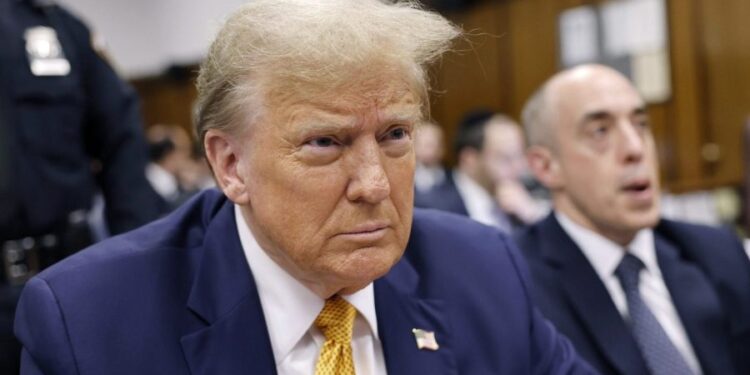
A New York judge on Friday delayed former President Trump’s sentencing until Nov. 26, a ruling that ensures Trump will not face any criminal punishment until after the election.
Trump has employed delay as a habitual legal strategy, hoping to retake the White House and halt his prosecutions.
He already had successfully dismissed or tied up three of his four criminal cases in pre-trial issues until after the election. Friday’s ruling hands Trump a similar victory in his hush money case, the only one to have so far to have culminated in a guilty verdict.
Judge Juan Merchan, who oversaw the seven-week trial, was set to sentence Trump on Sept. 18. But he granted the delay after Trump contended one was necessary for several reasons, including that he would first appeal if Merchan doesn’t toss the 34-count conviction on presidential immunity grounds.
Trump made relentless efforts to delay his hush money trial, but they failed. Last month, he tried for a second time to remove his case to federal court — a last-ditch move that was swiftly rejected by a federal judge, who said the former president failed to show “good cause.”
Ever since the Supreme Court carved out presidential immunity last month, however, Trump has experienced newfound success.
Upon a jury convicting him on 34 charges of falsifying business records, which stem from hush money deals during Trump’s 2016 campaign, Merchan originally scheduled Trump’s sentencing for July. Trump’s attorneys at the time did not object to the date.
But after the Supreme Court ruled that former presidents’ official acts carry at least presumptive criminal immunity, and that any protected conduct can’t be brought in as evidence — Trump again sought delays. The judge quickly pushed the sentencing to September so the former president could first mount an effort to wipe his guilty verdict.
Though the hush money payments in question and much of the trial concerned actions before Trump took office, his attorneys contend that the jury improperly saw tweets from his White House days, his government ethics form, testimony from two White House aides and a handful of other protected acts.
Merchan is set to rule on whether the verdict can stand by Sept. 16. Trump’s team has newly signaled they will immediately file appeals if the case moves forward, which would’ve raised the possibility of last-minute chaos if his sentencing remained on Sept. 18.
“A single business day is an unreasonably short period of time for President Trump to seek to vindicate these rights, if he must, in order to avoid the ‘prospect of an Executive Branch that cannibalizes itself’ in future generations,” Trump’s attorneys wrote in their delay request.
Prosecutors did not oppose a delay, deferring to the judge and noting the security complications of preparing for Trump’s sentencing only for it to be cancelled at the last minute. They critiqued some of Trump’s other delay arguments, however, including his previously rejected complaints about the judge’s daughter’s work at a progressive digital agency.
“The People respectfully defer to the Court on the appropriate post- trial schedule,” prosecutors wrote.
Ella Lee contributed.






